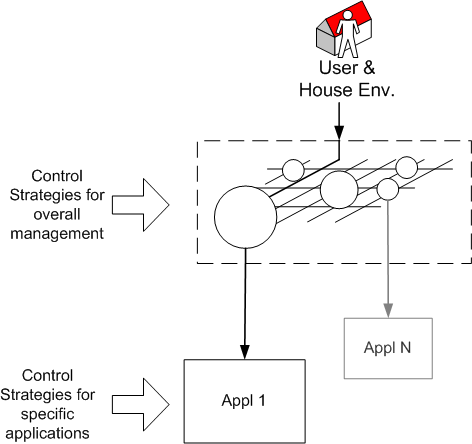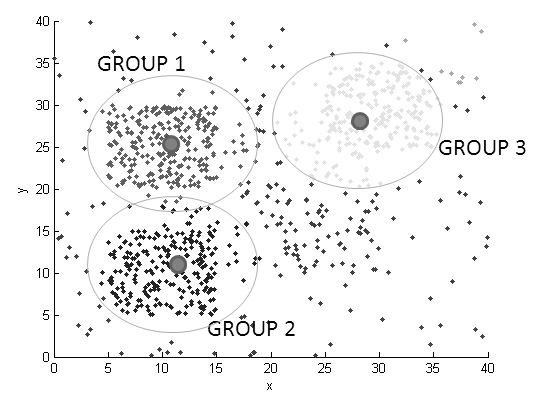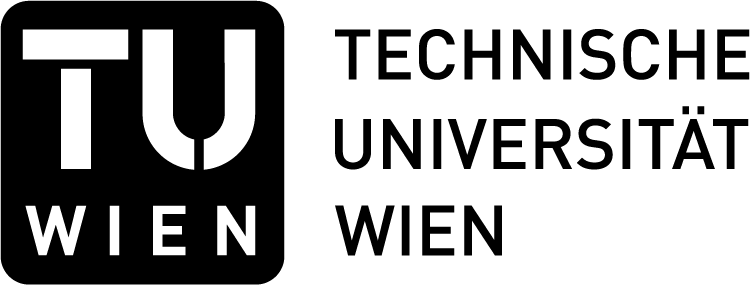ThinkHome pursues the realization of intelligent smart home designs focused on the carefully integration of semantic context and artificial intelligence algorithms. The advanced intelligence is realized by means of control strategies that are embedded and cooperate fairly within the highly interoperable ThinkHome system structure that provides transparent access to data, users, building systems, and miscellaneous other services.
Therefore, control strategies are the core part of the intelligent operation of a ThinkHome building. They are responsible for the calculation of all actions (switching commands, start/stop times and many other parameters) that are executed by the underlying building automation systems. The control strategies are implemented in a dedicated agent. Hence, they are embedded in the agent framework and can access all information that is available in the system, either directly, by communication, or even by cooperation with other agents.
In the ThinkHome project, control strategies are simultaneously considered from two different levels of operation. On one hand, they cover the implementation of advanced algorithms that fulfill specific applications (e.g. thermal comfort of a room, advanced lighting, etc.), but also the definition of approaches for the joined management of the smart home as a whole (e.g. conflict resolution, priority definition, rules of cooperation, etc.). The boundaries of these two perspectives are not always clearly defined, but the underlying structures formed by the multi-agent system and the knowledge base allow to face the challenges in a fluid and flexible manner, providing profitable feedbacks for building productive and global context awareness

Application of control strategies at different levels
One of the more remarkable points that characterizes ThinkHome developments is the deployment of behavioral profiles for the creation of adaptable controllers. Here, context is abstracted by common behaviors and usages existing in the home environment, thus the smart system is able to build an internal representation map for the current scenario. Diverse controllers cooperatively share this information and take it into account to make accurate decisions in their own domains.
Artificial intelligence is demanded at different levels, starting already with techniques for the behavioral pattern discovery (developed using adavanced data mining and clustering techniques), which must be customized and adapted to the particular features of the home use cases.

Discovering behavioral patterns within data collected from the home environment
· Publications:
The next publications developed in the ThinkHome project deal with control methodologies and strategies for home applications.
-Félix Iglesias Vazquez and Wolfgang Kastner. Usage profiles for sustainable buildings. In Proc. of the 15th IEEE Conference on Emerging Techonologies and Factory Automation (ETFA' 10), pages 1-8, September 2010. [ bib | DOI | Abstract ]
-Christian Reinisch, Mario J. Kofler, Felix Iglesias, and Wolfgang Kastner. ThinkHome: Energy Efficiency in Future Smart Homes. EURASIP Journal on Embedded Systems, 2011:18, 2011. [ bib | .pdf ]
-Félix Iglesias Vázquez and Wolfgang Kastner. Clustering methods for occupancy prediction in smart home control. In Industrial Electronics (ISIE'11), IEEE International Symposium on, pp. 1321-1328, 27-30 June 2011. [ DOI ]
-Félix Iglesias Vázquez, Wolfgang Kastner and Christian Reinisch. Impact of user habits in smart home control. Emerging Technologies & Factory Automation (ETFA), 2011 IEEE 16th Conference on, pp. 1-8, 5-9 Sept. 2011. [ DOI ]
-Félix Iglesias Vázquez, Sergio Cantos Gaceo, Wolfgang Kastner and José A. Montero Morales. Behavioral Profiles for Building Energy Performance Using eXclusive SOM. ENGINEERING APPLICATIONS OF NEURAL NETWORKS, IFIP Advances in Information and Communication Technology, 2011, Volume 363/2011, 31-40. [ DOI ]
-Félix Iglesias Vázquez, Wolfgang Kastner, Sergio Cantos Gaceo and Christian Reinisch. Electricity load management in smart home control. 12th International IBPSA Conference, Building Simulation 2011, to appear, 14-16 Nov. 2011.

